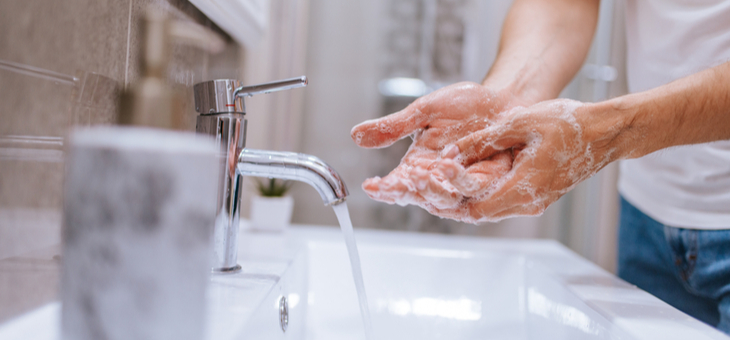One of the most positive trends to come from the COVID-19 pandemic has been the constant handwashing to make sure we wash off all the germs we bring in from outside.
All those germs have to go somewhere, however, and a new study suggests that handwashing is creating colonies of bacteria in our sinks, which could present a health problem all of its own.
In the largest study of sink bacteria conducted outside of hospitals, scientists at the University of Reading discovered communities of similar bacteria that largely remain down our drains after handwashing.
Read more: Voters divided over government’s COVID performance
The researchers found that there are significant differences between families of dominant bacteria depending on the location in the sink drains, and that plumbing systems such as P-trap or U-bend provide ideal environments for bacteria to grow.
Dr Hyun Soon Gweon said the study highlighted the need for better sink design to ensure that sinks stayed clean.
“The mantra to ‘wash your hands’ to fight coronavirus transmission has highlighted the importance of not only good hand hygiene, but also the need for well-designed and regularly cleaned sinks,” Dr Gweon said.
“Our study reveals that the significant difference in bacterial families between different buildings shows that a number of factors including occupancy and building design may have a big influence on the types of bacteria we come into contact with.”
Read more: Dying apart, buried together
Samples were taken from 123 sinks around non-clinical settings at the University of Reading – such as toilets and bathrooms in teaching, research and social spaces – and show that sinks have a distinct microbiome dominated by certain bacteria.
While the field work for the study was carried out in 2019, the authors explain that the hygiene behaviour associated with the pandemic would only accelerate the situation.
The plumbing area found beneath sinks revealed microbial communities dominated by a group of bacteria called Proteobacteria. This phylum includes pathogens such as Salmonella and E. coli, which can cause serious disease, although the proportion of bacteria from that family was low.
Higher concentrations were found of the common Moraxellaceae and Burkholderiaceae bacteria, which can cause infections but are mostly harmless to humans.
Read more: Vaccination for over 50s fast-tracked
The type of plumbing system had a significant effect on which family was more abundant. Below-sink strainers were found to have Moraxellaceae bacteria, while P-trap sinks, which have a P-trap style of drainage, had higher amounts of Burkholderiaceae.
Lead author Dr Zoe Withey said the bacteria in the sinks were being directly fed by bacteria living on the skin.
“The bacteria that live in our sink drains are shaped by what we are directly putting down them,” Dr Withey said.
“While we expected that bacteria from the gut would have a greater impact, caused by the wider environment of a bathroom, it seems that by and large the bacteria living on the skin of our hands are feeding the community in the drains beneath sinks.
“This means that we need to be very aware that what we are putting down our sinks is affecting the bacterial community underneath.
“These areas may not be reached during routine cleaning, and this could lead to communities containing hardier, resistant microbes.”
The scientists point out that all the sinks where samples were taken were regularly cleaned.
“We hope our findings will remind people that the bacteria on your hands often stay alive and are capable of growing even after they have been washed off, even in the presence of soap and warm water,” Dr Gweon said.
“It is possible to spread bacteria to the surrounding areas of your sink, where they can grow and persist. Reducing transmission of bacteria requires thorough disinfection of the sinks and surrounding areas and not just getting your hands wet.”
How often do you clean your sink area and how thoroughly do you clean it? Do you clean your sink with disinfectant?
If you enjoy our content, don’t keep it to yourself. Share our free eNews with your friends and encourage them to sign up.

